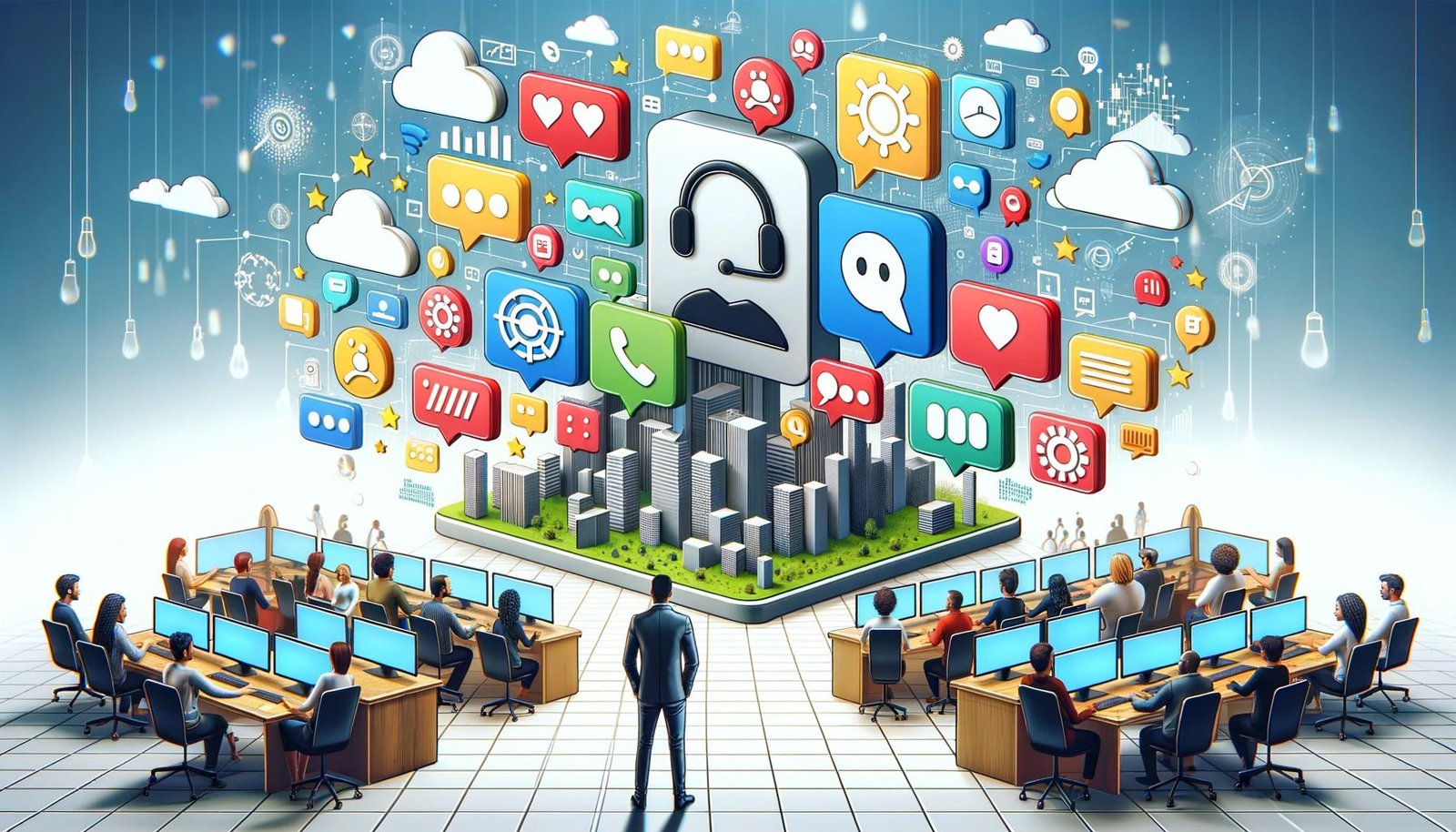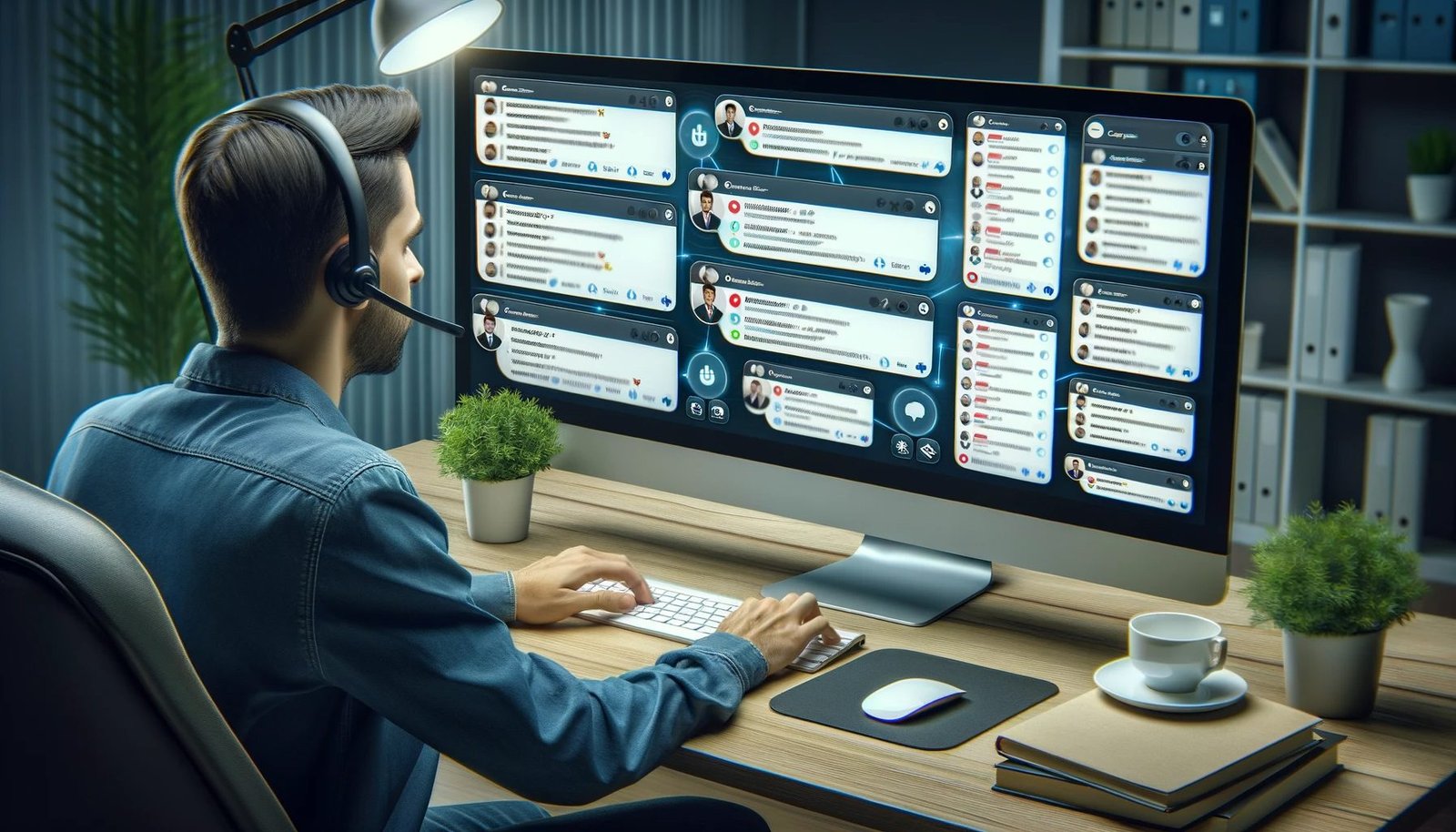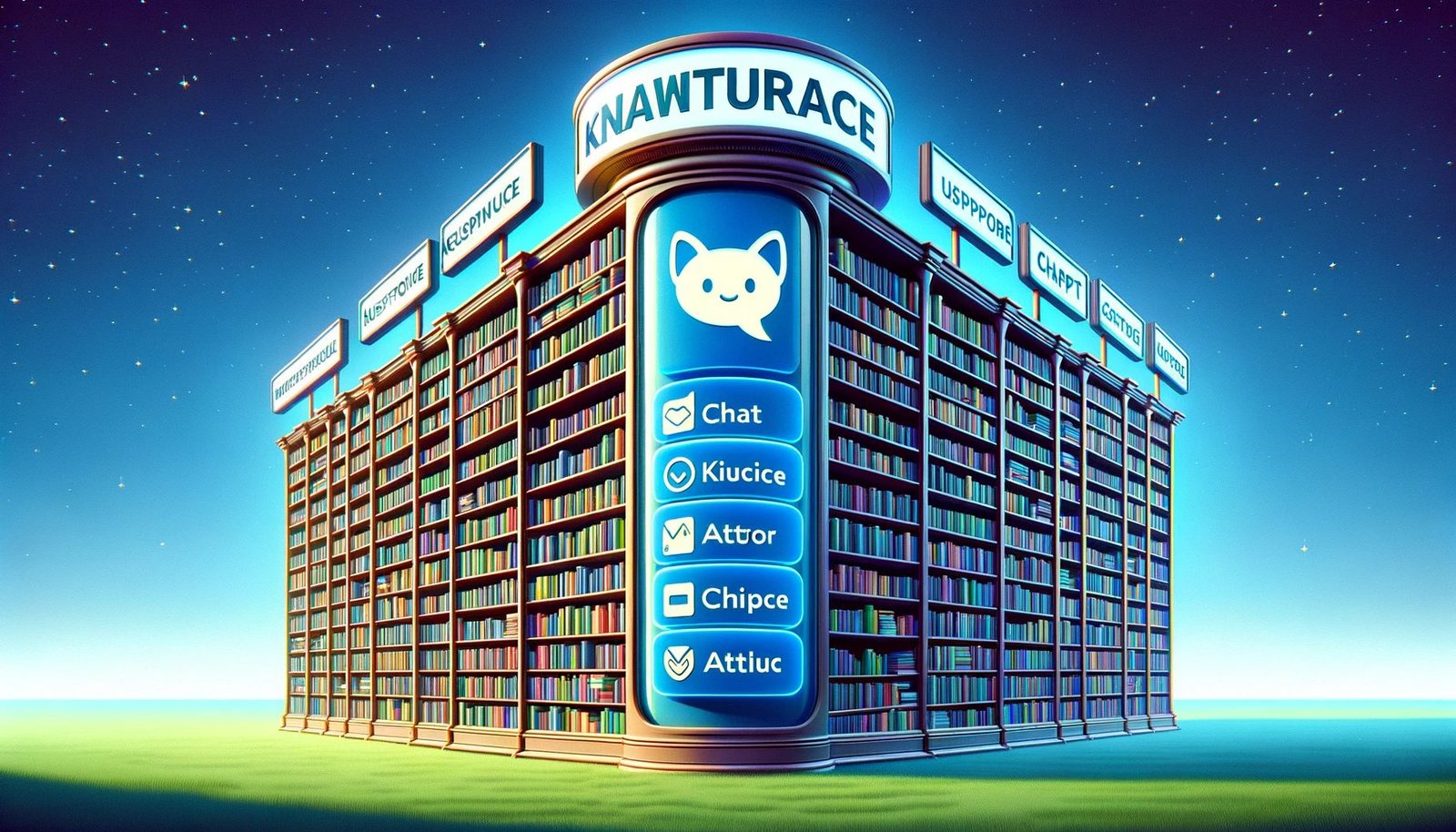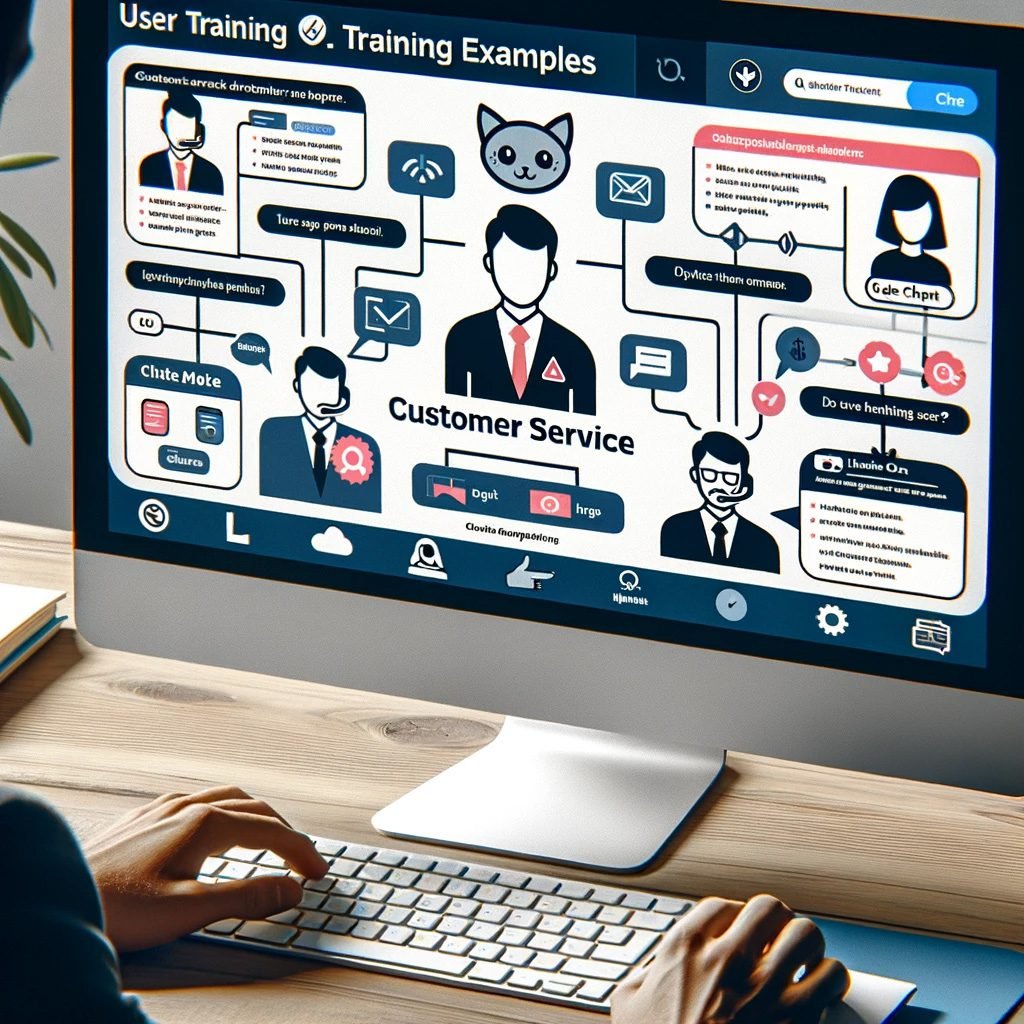How to Choose the Right Live Chat Software Alternative to ChatGPT Customer Service for Your Business
How to Choose the Right Live Chat Software Alternative to ChatGPT Customer Service for Your Business
Introduction – Live Chat Software Alternative to ChatGPT Customer Service
In today’s digital-driven world, the immediacy of customer support has become paramount. As businesses transition to online platforms, the demand for real-time interactions has skyrocketed. While conversational AI platforms like ChatGPT have been at the forefront of this transformation, there’s an increasing need for more specialized tools that cater to instantaneous customer queries.
The importance of real-time customer support in today’s digital age
The digital age has redefined customer expectations. With the proliferation of online businesses and the convenience of e-commerce, customers anticipate instant responses. A delay of even a few minutes can lead to lost sales or, worse, a disgruntled customer voicing their dissatisfaction across social media platforms. In this context, tools like ChatGPT have been invaluable, offering automated responses to frequent queries. However, as businesses grow and customer interactions become more complex, the need for real-time, human-like interactions becomes evident.
Setting the stage for exploring live chat software alternatives to ChatGPT
While ChatGPT, with its advanced AI capabilities, has been a game-changer for many businesses, it’s not the only tool in the arsenal. Live chat software, designed specifically for real-time interactions, offers features tailored to the needs of online businesses. These platforms, such as Zendesk and Intercom, provide businesses with the means to engage customers instantly, answer queries in real time, and foster a sense of trust and reliability. As we delve deeper into this article, we’ll explore these live chat software options, understanding their features, benefits, and how they stand as formidable alternatives to ChatGPT in the realm of real-time customer support.

ChatGPT in Customer Service: A Quick Recap
In the vast landscape of AI-driven customer service tools, ChatGPT has emerged as a notable contender, revolutionizing the way businesses interact with their customers.
A brief overview of ChatGPT and its capabilities
ChatGPT, a product of OpenAI, is a state-of-the-art conversational AI model. Building on the foundations of the GPT (Generative Pre-trained Transformer) architecture, ChatGPT is designed to understand and generate human-like text based on the input it receives. Its advanced capabilities allow it to engage in meaningful conversations, answer queries, and even generate creative content. With its ability to process and generate language in real time, ChatGPT has found its niche in customer service, offering businesses an automated yet highly sophisticated tool for customer interactions.
How businesses have been using ChatGPT for real-time customer interactions
Many businesses, ranging from e-commerce platforms to WordPress web development services, have integrated ChatGPT into their customer service workflows. The appeal lies in its ability to provide instant responses, 24/7 availability, and consistent quality of service. For instance, an online store might use ChatGPT to answer frequent queries about product specifications, shipping details, or return policies. Similarly, a WordPress consulting website might employ ChatGPT to guide users through troubleshooting steps or provide information about their services. The versatility and efficiency of ChatGPT have made it a preferred choice for businesses aiming to enhance their real-time customer support without significantly increasing operational costs.
The Need for Dedicated Live Chat Solutions
In the digital age, where instant gratification is the norm, businesses are under constant pressure to provide real-time solutions to their customers. While AI-driven tools like ChatGPT have significantly enhanced the speed and efficiency of customer interactions, there’s an increasing demand for more specialized live chat solutions.
The limitations of relying solely on AI like ChatGPT for live interactions
- Lack of Human Touch: No matter how advanced an AI is, it lacks the emotional intelligence and nuance that human agents bring to the table. For sensitive issues or complex queries, customers often prefer human interaction over automated responses.
- Handling Multifaceted Queries: While ChatGPT can handle a wide range of questions, there are instances where queries might be too intricate or multi-layered for an AI to comprehend fully. In such cases, misinterpretations can lead to customer dissatisfaction.
- Dependence on Training Data: ChatGPT, like other AI models, relies heavily on its training data. If it hasn’t been trained on a specific topic or if a user’s query is too niche, the AI might not provide a satisfactory answer.
- Potential for Miscommunication: Automated systems can sometimes misinterpret user intent, leading to irrelevant or incorrect responses. This can be especially problematic in industries where precision is crucial, such as legal and law firm websites or medical consulting platforms.
- Lack of Personalization: While AI can be programmed to simulate personalized interactions, dedicated live chat solutions often have integrated CRM systems that provide agents with a customer’s entire interaction history, allowing for a more tailored and personal conversation.
While ChatGPT and similar AI tools offer incredible advantages in terms of scalability and efficiency, there’s a growing need for dedicated live chat solutions that offer a blend of automation and human touch. These platforms not only address the limitations of AI but also provide businesses with comprehensive tools to enhance customer experience in real-time interactions.
The Benefits of Human Touch in Customer Service
In an era dominated by automation and artificial intelligence, the human touch in customer service remains irreplaceable. While technology has undeniably enhanced efficiency and speed, the emotional and empathetic aspects of human interaction offer unique advantages that machines can’t replicate.
Emotional Intelligence and Empathy
- Understanding Nuances: Humans can pick up on subtle cues, emotions, and tones in a conversation. This allows them to understand the underlying sentiments of a customer, even if they aren’t explicitly stated. For instance, a customer might not directly express frustration, but a skilled agent can sense it through their choice of words or tone.
- Building Genuine Relationships: Human agents can form connections, share personal experiences, and relate to customers on a deeper level. This rapport-building can lead to increased customer loyalty and trust. It’s the reason why many personal websites or consulting platforms prioritize human interaction.
Flexibility and Adaptability
- Tailored Responses: Unlike AI, which often relies on pre-programmed responses, human agents can think on their feet. They can adapt their responses based on the flow of the conversation, ensuring that the customer feels heard and understood.
- Handling Complex Queries: While AI can answer straightforward questions, intricate or multifaceted issues often require human intervention. Humans can ask follow-up questions, clarify doubts, and provide comprehensive solutions.
Trust and Assurance
- Providing Reassurance: In situations where customers are upset or frustrated, a human touch can be calming. A simple statement like “I understand how you feel” or “I’m here to help” can go a long way in diffusing tension.
- Handling Sensitive Issues: For topics that require discretion or sensitivity, such as financial matters on banking websites or personal issues on medical platforms, human agents can provide the necessary tact and understanding.
Feedback and Continuous Improvement
- Gathering Insights: Human agents can gather direct feedback from customers, understand their pain points, and provide these insights to the business. This feedback loop is invaluable for continuous improvement.
- Training and Development: Based on their interactions, human agents can be trained and upskilled to handle a wider range of queries and scenarios, ensuring that the quality of service improves over time.
Live Chat Software Alternative 1: Intercom
Intercom, a name synonymous with real-time customer communication, has carved a niche for itself in the realm of live chat software. As businesses increasingly recognize the importance of instantaneous interactions, platforms like Intercom have emerged as frontrunners, offering solutions that go beyond traditional chat functionalities.
Overview and Standout Features of Intercom
1. Unified Customer Communication Platform: Intercom is not just a live chat tool; it’s a comprehensive platform that integrates various facets of customer communication, from chat to email to product tours.
2. Customizable Messenger: Intercom’s messenger can be tailored to match a brand’s aesthetics. This ensures that the chat interface feels like a natural extension of the website or app, providing a seamless experience for users.
3. Automated Chatbots: With Intercom’s Resolution Bot, businesses can automate responses to frequently asked questions. This ensures that customers receive instant answers, even if human agents are unavailable.
4. Targeted Messaging: Intercom allows businesses to send targeted and personalized messages based on user behavior. This can be particularly useful for e-commerce website development, where understanding customer intent is crucial.
5. User Segmentation: Intercom provides detailed user data, allowing businesses to segment their audience based on various parameters like location, behavior, or product usage.
6. Integrated App Marketplace: Intercom boasts an extensive app marketplace, enabling businesses to integrate with other tools and platforms seamlessly. This is especially beneficial for businesses that rely on WordPress web development plugins or other third-party solutions.
How Intercom Facilitates Real-Time Interactions and Customer Engagement
1. Instantaneous Responses: With Intercom, businesses can engage customers the moment they land on their website. This immediacy can significantly enhance user experience and boost conversions.
2. Contextual Conversations: The Intercom stores previous chat histories, allowing agents to pick up conversations right where they left off. This context ensures that customers don’t have to repeat themselves, leading to smoother interactions.
3. Proactive Outreach: Instead of waiting for customers to initiate a chat, Intercom enables businesses to proactively reach out based on user behavior. For instance, if a customer seems to be struggling with the checkout process on an e-commerce platform, an agent can intervene to assist.
4. Feedback Collection: Intercom’s real-time chat can be used to gather instant feedback, helping businesses understand their customers better and refine their offerings.
5. Enhancing User Onboarding: With product tours and onboarding prompts, Intercom ensures that users understand a platform’s features and benefits, leading to increased adoption and loyalty.
In essence, Intercom has redefined what businesses can achieve with live chat software. By focusing on real-time interactions and customer engagement, it offers a holistic solution that caters to the dynamic needs of modern businesses.

Live Chat Software Alternative 2: LiveChat
In the bustling marketplace of live chat solutions, LiveChat stands out as a robust and user-friendly platform. Designed with both businesses and customers in mind, it offers a suite of features that ensure seamless and efficient real-time interactions. As businesses transition to digital platforms, tools like LiveChat become indispensable in delivering top-notch customer service.
Introduction to LiveChat’s Capabilities
1. Intuitive Interface: LiveChat boasts a clean and intuitive dashboard, making it easy for agents to manage multiple chats, view customer details, and access chat histories.
2. Customization: Businesses can tailor LiveChat’s appearance to align with their branding, ensuring a consistent look and feel across all customer touchpoints.
3. Advanced Analytics: LiveChat provides in-depth analytics, allowing businesses to track chat volume, customer satisfaction, and agent performance. This data is invaluable for businesses looking to refine their customer support strategies.
4. Integrations: LiveChat seamlessly integrates with a plethora of tools and platforms, from CRM systems to WordPress web development plugins, ensuring a cohesive ecosystem.
5. Chatbots: With LiveChat, businesses can deploy chatbots to handle routine queries, ensuring customers receive instant responses even during high-traffic periods or off-hours.
6. Multilingual Support: Catering to a global audience, LiveChat offers multilingual support, breaking down language barriers and ensuring effective communication with customers worldwide.
Benefits for Businesses Aiming to Provide Instant Support
1. Increased Sales: By addressing customer queries in real time, businesses can guide them through the purchasing process, leading to increased conversions. This is especially beneficial for sectors like WordPress e-commerce website development, where instant support can significantly impact sales.
2. Enhanced Customer Satisfaction: With LiveChat, customers no longer have to wait in long phone queues or navigate complex email threads. They get their queries resolved instantly, leading to higher satisfaction levels.
3. Reduced Support Costs: By streamlining customer interactions and automating routine queries with chatbots, businesses can reduce their operational costs.
4. Feedback Collection: LiveChat allows businesses to gather real-time feedback, helping them understand customer pain points and refine their offerings.
5. Competitive Edge: In today’s digital age, offering real-time support can set a business apart from its competitors. LiveChat ensures that companies are always available for their customers, fostering loyalty and trust.
LiveChat, with its comprehensive features and focus on real-time support, offers businesses a powerful tool to enhance their customer service. In an era where instant gratification is the norm, platforms like LiveChat ensure that businesses stay ahead of the curve, delivering exceptional customer experiences.
Live Chat Software Alternative 3: Tawk. to
In the realm of live chat solutions, Tawk. Has carved a niche for itself, especially among startups and small businesses. Its commitment to providing a free yet feature-rich platform has made it a go-to choice for many looking to enhance their real-time customer interactions without breaking the bank.
Key Features and Functionalities of Tawk. to
1. Completely Free: Unlike many other live chat platforms, Tawk. Offers its core features entirely for free, allowing businesses to engage with their customers without any financial constraints.
2. Customizable Widgets: Tawk. Provides a customizable chat widget that can be tailored to match the branding and aesthetics of any website, from WordPress personal websites to e-commerce platforms.
3. Mobile Apps: With dedicated apps for both Android and iOS, Tawk. Ensures that businesses can stay connected with their customers on the go.
4. Automated Triggers: Businesses can set up automated messages based on specific customer behaviors, ensuring proactive engagement.
5. Built-in Ticketing System: Beyond live chats, Tawk. to offers a ticketing system, allowing businesses to track and manage customer queries efficiently.
6. Multilingual Support: Catering to a diverse audience, Tawk. to supports multiple languages, ensuring effective communication regardless of linguistic barriers.
7. Detailed Analytics: Tawk. Provides comprehensive chat analytics, giving businesses insights into chat volumes, visitor behaviors, and agent performance.
8. Integrations: Tawk. to can be seamlessly integrated with a plethora of third-party applications and platforms, ensuring a cohesive customer support ecosystem.
The Advantage of Tawk.to’s Free Model for Startups and Small Businesses
For startups and small businesses operating on tight budgets, customer support tools can often seem like a luxury, however, with Tawk. To’s free model, they can enjoy the benefits of a premium live chat solution without any financial constraints. This democratization of customer support tools ensures that even the smallest of businesses can compete with industry giants in terms of customer service.
Moreover, Tawk. To’s commitment to continuous improvement means that businesses don’t have to compromise on features or functionality. From WordPress blog websites to large e-commerce platforms, Tawk. ‘s versatility makes it suitable for a wide range of applications.
Tawk. To, with its robust features and unbeatable price point, offers startups and small businesses a golden opportunity to enhance their customer interactions. In a world where customer experience can make or break a business, tools like Tawk. Ensure that businesses of all sizes can deliver top-notch service.
Live Chat Software Alternative 4: Olark
In the bustling market of live chat solutions, Olark stands out with its blend of customization and powerful analytics. Catering to a diverse range of businesses, from WordPress construction websites to expansive e-commerce platforms, Olark offers tools that not only facilitate real-time interactions but also provide insights to refine the overall customer experience.
Exploring olark’s Customizable Chat Widgets
1. Tailored Branding: Olark’s chat widgets can be fully customized to align with a brand’s identity. This includes changing colors, themes, and even the positioning of the chat box on the webpage.
2. Targeted Chat: Businesses can set up rules to trigger the chat widget based on specific user behaviors or pages visited. This ensures that the chat pops up at the most opportune moments, enhancing engagement.
3. Offline Messaging: Even when agents are not online, Olark’s widget allows customers to leave messages, ensuring that no query goes unanswered.
4. Automated Greetings: Olark lets businesses set up automated messages that greet visitors based on various criteria, such as the time spent on the site or the number of pages visited.
Olark’s Powerful Analytics
1. Real-time Reporting: Olark provides real-time chat reports, allowing businesses to monitor chat volumes, response times, and customer satisfaction.
2. Visitor Insights: With Olark, businesses can gain insights into where their visitors are coming from, which pages they’ve visited, and even their shopping cart contents on e-commerce sites.
3. Agent Performance: Olark’s analytics also delve into agent metrics, helping businesses identify star performers and areas that need improvement.
4. Transcripts and Search: All chat interactions are stored and can be easily searched, providing businesses with a treasure trove of data to understand customer pain points and preferences.
How Olark Enhances the Customer Experience on Websites
Olark’s emphasis on customization ensures that the chat experience feels organic and in line with the brand’s identity. Whether it’s a WordPress spa website or a global online marketplace, Olark’s chat widget seamlessly integrates, providing visitors with instant support.
Moreover, the insights gained from Olark’s analytics enable businesses to refine their support strategies continuously. By understanding visitor behaviors and preferences, businesses can tailor their interactions to provide value, building trust and loyalty.
Olark offers a comprehensive solution for businesses aiming to elevate their real-time customer support. With its blend of customization and analytics, Olark ensures that businesses are not just reacting to customer queries but are proactively enhancing the overall customer experience.
Live Chat Software Alternative 5: Drift
In the realm of live chat solutions, Drift has carved a niche for itself by merging the worlds of conversational marketing and real-time customer support. Recognized by many businesses, from WordPress blog websites to expansive online stores, Drift offers a dynamic platform that not only addresses customer queries but also actively engages visitors, turning them into potential leads.
A Look into Drift’s Conversational Marketing Platform
1. Chatbots with a Purpose: Drift’s AI-powered chatbots are designed to engage visitors the moment they land on a site. These bots can answer queries, schedule meetings, and even qualify leads without human intervention.
2. Personalized Interactions: Drift allows businesses to tailor chat interactions based on visitor behavior, source of traffic, or even specific marketing campaigns. This ensures that each visitor gets a personalized experience.
3. Seamless Integrations: Drift can be easily integrated with other marketing and sales tools, ensuring that leads captured via chat are directly funneled into CRM systems or email marketing campaigns.
4. Real-time Notifications: Whenever a visitor takes a significant action, like requesting a demo or downloading a resource, Drift sends real-time notifications to the sales team, ensuring immediate follow-up.
The Potential for Businesses to Capture Leads and Provide Support Simultaneously
1. Dual Functionality: Drift’s platform is designed to serve two primary functions – lead generation and customer support. While the chatbots engage and qualify leads, human agents can step in to handle complex queries or close deals.
2. Data-Driven Insights: Drift provides comprehensive analytics, giving businesses insights into chat performance, lead conversion rates, and agent effectiveness. This data can be invaluable for refining marketing and support strategies.
3. Playbooks: Drift’s playbooks allow businesses to set up specific chat scenarios for different pages or campaigns. For instance, a visitor landing on a WordPress e-commerce website development page might be engaged with a chatbot offering a free consultation, while another on the pricing page might be offered a discount code.
4. Enhancing User Experience: By providing instant responses and solutions, Drift ensures that visitors have a positive experience, increasing the chances of them turning into loyal customers.
Drift’s conversational marketing platform offers businesses a unique blend of proactive engagement and real-time support. By capturing leads and addressing queries simultaneously, businesses can optimize their conversion rates and enhance customer satisfaction. In the ever-competitive digital landscape, tools like Drift can be the differentiator between a lost visitor and a loyal customer.
Comparative Analysis: ChatGPT vs. Live Chat Software Alternatives
In the digital age, where instant communication is paramount, businesses are constantly seeking the best tools to engage with their customers. While ChatGPT has revolutionized conversational AI, live chat software alternatives bring their own set of advantages. Let’s delve into a comparative analysis of ChatGPT and some of the leading live chat software alternatives.
Strengths and Weaknesses of Each Platform
1. ChatGPT:
- Strengths:
- AI-Powered: Leveraging advanced AI, ChatGPT can handle a vast array of queries without human intervention.
- Scalability: Ideal for businesses receiving a high volume of repetitive queries, as it can handle multiple interactions simultaneously.
- Cost-Effective: Reduces the need for a large customer support team, especially for WordPress support services.
- Weaknesses:
- Limited Personal Touch: While AI is advanced, it can’t replicate the human touch in sensitive or complex situations.
- Potential Misunderstandings: AI might not always grasp the nuances of certain queries, leading to potential miscommunication.
2. Intercom:
- Strengths:
- Real-time Interaction: Offers instant communication, enhancing customer satisfaction.
- Integration Capabilities: Seamlessly integrates with various business tools, streamlining workflows.
- Customizable: Allows businesses to tailor interactions based on visitor behavior.
- Weaknesses:
- Cost: Higher-tier plans can be expensive for small businesses.
- Learning Curve: Requires training to utilize its full potential.
3. LiveChat:
- Strengths:
- User-Friendly: The intuitive interface makes it easy for both agents and customers.
- Analytics: Provides comprehensive insights into chat performance and customer behavior.
- Multichannel Support: Integrates with social media and other platforms.
- Weaknesses:
- Limited Free Version: The free version has limited features, pushing businesses towards paid plans.
- Requires Human Agents: Unlike AI, it requires human intervention, which can be a limitation during high traffic.
4. Tawk. To:
- Strengths:
- Cost-Effective: Offers a robust free model, making it ideal for startups and small businesses.
- Multilingual Support: Can cater to a global audience with its language capabilities.
- Weaknesses:
- Ads in Free Version: The free version comes with branded ads, which might not appeal to all businesses.
- Limited Customization: Compared to premium tools, it offers limited customization options.
5. Olark:
- Strengths:
- Customizable Chat Widgets: Businesses can tailor the chat interface to match their branding.
- Detailed Reporting: Offers insights into agent performance and customer satisfaction.
- Weaknesses:
- No Free Plan: Unlike some competitors, Olark doesn’t offer a free version.
- Limited Integrations: This doesn’t integrate as seamlessly with as many third-party tools as some alternatives.
Suitability for Different Business Sizes and Industries
- Startups and Small Businesses: Tawk. To, with its free model, is ideal for startups. LiveChat and Olark, with their user-friendly interfaces, can also be suitable for small businesses with limited support teams.
- Mid-sized Businesses: Intercom and LiveChat, with their integration capabilities and advanced features, are more suited for mid-sized businesses looking to scale their operations.
- Large Enterprises: ChatGPT, with its AI capabilities, can handle the volume of queries large enterprises receive. Intercom and LiveChat, with their comprehensive features and analytics, are also suitable.
- Industries: While all platforms can be tailored to various industries, ChatGPT’s AI capabilities might be especially beneficial for tech industries, including WordPress web development, where queries can be technical. Live chat solutions like Intercom and LiveChat are versatile and can be adapted to industries ranging from e-commerce to healthcare.
While ChatGPT offers advanced AI capabilities, live chat software alternatives provide the human touch and real-time interactions that many customers value. The choice between them depends on a business’s specific needs, size, and industry.
Key Considerations When Choosing a Live Chat Software
In today’s fast-paced digital landscape, live chat software has become an indispensable tool for businesses aiming to provide real-time customer support. However, with a plethora of options available, making the right choice can be daunting. Here are some key considerations to keep in mind when evaluating live chat software alternatives to ChatGPT for your business.
a. Integration Capabilities: Compatibility with existing tools and platforms.
Integration is the backbone of seamless operations. When considering live chat software, it’s crucial to ensure it integrates effortlessly with your existing tools, be it CRM systems, email marketing platforms, or even WordPress web development tools. This ensures a unified customer view and streamlined workflows and maximizes the utility of all your business tools.
b. Customization Options: Aligning the chat interface with brand aesthetics.
Your live chat interface is an extension of your brand. Opt for software that allows you to customize the look and feel of the chat widget to align with your brand’s aesthetics. This not only enhances brand consistency but also instills trust and familiarity among users.
c. Reporting and Analytics: Gaining insights into customer interactions.
In the age of data-driven decision-making, having access to analytics is non-negotiable. The right live chat software should provide comprehensive reports on chat histories, agent performance, customer feedback, and more. These insights can be invaluable in refining your customer support strategy and understanding customer preferences.
d. Pricing and Scalability: Finding a solution that grows with the business.
Budget constraints are a reality for most businesses. However, it’s essential to view live chat software as an investment rather than an expense. Evaluate the pricing structures of different platforms, considering both immediate needs and future scalability. As your business grows, your customer support needs will evolve, so choose a solution that can scale with you.
e. Support and Training: Ensuring a smooth implementation and usage.
Implementing a new tool can come with a set of challenges. Opt for a live chat software provider that offers robust support and training resources. Whether it’s onboarding, technical issues, or best practices, having access to expert guidance can make the transition smoother and ensure you’re leveraging the software to its fullest potential.
While the allure of advanced features and capabilities is undeniable, it’s essential to choose a live chat software that aligns with your business’s unique needs and goals. By keeping these considerations in mind, you can ensure a more informed decision, enhancing customer interactions and driving business growth.
Real-World Success Stories
In the realm of customer support, real-world applications often speak louder than theoretical benefits. Many businesses have transitioned from relying solely on AI solutions like ChatGPT to incorporating dedicated live chat software. Let’s delve into some compelling case studies that highlight the transformative impact of such a shift.
Case Study 1: A Growing E-commerce Brand Embraces LiveChat
Background: A burgeoning e-commerce brand, initially using ChatGPT for basic customer queries, found that as its customer base grew, so did the complexity and variety of inquiries.
Transition: Recognizing the need for a more dynamic solution, they integrated LiveChat. This allowed them to offer real-time support, addressing queries about products, shipping, and more.
Outcome: Post-integration, the brand saw a 30% reduction in cart abandonment rates and a 25% increase in sales conversions. Customer feedback also highlighted appreciation for the “human touch” in support interactions.
Case Study 2: Tech Startup Leverages Intercom for User Onboarding
Background: A SaaS startup using ChatGPT for initial user interactions wanted to enhance user onboarding and reduce churn.
Transition: They chose Intercom for its robust live chat capabilities combined with user segmentation and personalized messaging.
Outcome: The startup experienced a 40% increase in user retention, with new users praising the platform’s proactive support during the onboarding phase. The ability to address technical queries in real time significantly enhanced user experience.
Case Study 3: Online Education Platform Boosts Engagement with Tawk. to
Background: An online learning platform, initially using ChatGPT for student queries, sought to foster a more interactive learning environment.
Transition: By integrating Tawk. To they facilitated real-time interactions between students and educators, allowing instant query resolution and fostering a collaborative learning atmosphere.
Outcome: The platform saw a 50% increase in student engagement, with many students highlighting the value of immediate feedback and interactive support in enhancing their learning experience.
These success stories underscore the tangible benefits businesses can reap by transitioning to dedicated live chat software. While AI-driven solutions like ChatGPT offer value, the combination of AI with human-driven live chat can elevate customer support to new heights, driving engagement, loyalty, and growth.
The Role of AI in Live Chat Software
In today’s digital age, the fusion of artificial intelligence with live chat software has revolutionized customer support. As businesses strive to offer instant, efficient, and personalized support, the synergy between AI and human touch becomes paramount.
How Modern Live Chat Tools Incorporate AI for Better Efficiency
Predictive Responses: Modern live chat tools leverage AI to predict customer queries based on initial inputs. This allows for faster response times as the system can suggest answers even before the user finishes typing.
Chatbots for Basic Queries: Many live chat platforms integrate AI-driven chatbots that handle routine questions, freeing up human agents to tackle more complex issues. For instance, queries about business hours, product availability, or shipping status can be instantly addressed by chatbots.
User Behavior Analysis: AI algorithms can analyze user behavior on websites in real time. This enables the live chat tool to proactively initiate conversations when a user seems confused or spends too much time on a particular page.
Natural Language Processing (NLP): With advancements in NLP, live chat tools can understand and process user queries more naturally and contextually, ensuring relevant responses.
Automated Follow-ups: Post-interaction, AI can automate follow-up messages, ensuring customers are satisfied with the support they received or offering additional assistance if needed.

The Balance Between AI and Human Interactions
While AI offers efficiency, speed, and scalability, the human element in customer support remains irreplaceable. Here’s why:
Complex Problem Solving: AI can handle routine queries, but when it comes to intricate issues or nuanced situations, human agents are essential. They bring empathy, understanding, and problem-solving skills that AI can’t replicate.
Building Relationships: Genuine human interactions foster trust and loyalty. Personalized conversations, understanding customer emotions, and offering tailored solutions go a long way in building lasting customer relationships.
Continuous Learning: Feedback from human agents can be used to train and refine AI models, making them more efficient over time. This symbiotic relationship ensures that the live chat tool remains updated and relevant.
While AI-driven solutions like ChatGPT have significantly enhanced the capabilities of live chat software, the human touch remains indispensable. The future of customer support lies in striking the right balance between AI’s efficiency and the empathy and adaptability of human interactions.
The Future of Live Chat Tools
The digital landscape is ever-evolving, and with it, the tools businesses use to engage with their customers. Live chat software, once a mere support tool, is now at the forefront of customer engagement and sales strategies. As we look ahead, several trends and predictions emerge that will shape the future of live chat tools.
Predictions and Trends for Live Chat Software
1. AI-Powered Personalization: With advancements in AI and machine learning, live chat tools will offer even more personalized experiences. Based on user behavior, purchase history, and past interactions, chatbots will provide tailored product recommendations, support solutions, and more.
2. Omnichannel Support: Live chat will integrate seamlessly with other communication channels like email, social media, and phone support. This omnichannel approach ensures that customers receive consistent support regardless of their preferred communication method.
3. Voice-Activated Live Chat: As voice search and voice-activated devices become more prevalent, live chat tools will incorporate voice recognition features, allowing users to engage in voice chats with support agents or AI-driven assistants.
4. Advanced Analytics: Beyond basic metrics, live chat tools will offer in-depth analytics, providing insights into customer sentiment, agent performance, and potential sales opportunities.
5. Augmented Reality (AR) Integration: Especially for e-commerce businesses, integrating AR with live chat can allow agents to offer virtual product demos, walkthroughs, or even virtual store tours.
6. Enhanced Security: As cyber threats become more sophisticated, live chat tools will prioritize end-to-end encryption, ensuring that customer data and interactions remain confidential.
7. Integration with IoT: With the Internet of Things (IoT) expanding, live chat tools will integrate with smart devices. For instance, customer-facing issues with their smart fridge could initiate a live chat directly from the appliance.
8. Self-Service Portals: Beyond traditional live chat, businesses will offer self-service portals where customers can find solutions, watch tutorials, or access FAQs, reducing the need for live agent interactions.
How Businesses Can Stay Ahead of the Curve
Stay Updated: Regularly update the live chat software to leverage the latest features and security measures.
Continuous Training: Ensure that customer support agents are trained on the latest tools, technologies, and best practices.
Feedback Loop: Actively seek feedback from both customers and support agents to refine and improve the live chat experience.
Integrate with Other Tools: Ensure that the live chat tool integrates seamlessly with CRM systems, sales platforms, and other essential business tools.
Stay Informed: Keep an eye on industry news, attend webinars, and participate in forums to stay informed about the latest trends in live chat technology.
The future of live chat is bright, with numerous innovations on the horizon. By staying informed and proactive, businesses can leverage these tools to offer unparalleled customer support, drive sales, and stay ahead in the competitive digital landscape.
Conclusion
In today’s fast-paced digital age, the way businesses interact with their customers can make or break their reputation. While conversational AI tools like ChatGPT have revolutionized customer interactions, there’s an undeniable value in human touch, especially when it comes to real-time support. Live chat software bridges this gap, offering the immediacy of AI with the empathy and understanding of human agents.
Choosing the right live chat software goes beyond just facilitating conversations. It’s about enhancing the customer experience, building trust, and fostering long-term relationships. The right tool can streamline workflows, provide invaluable insights, and ultimately drive business growth.
As we’ve explored various live chat software alternatives to ChatGPT, it’s evident that each comes with its unique features and strengths. Whether it’s the robustness of Intercom, the user-friendliness of LiveChat, or the affordability of Tawk. , the choice boils down to individual business needs and goals.
In conclusion, while the landscape of customer support tools continues to evolve, the core principle remains the same: prioritizing customer satisfaction. As businesses venture into the future, it’s crucial to equip themselves with tools that resonate with their vision and values. So, take the plunge, explore the myriad of options available, and find that perfect live chat solution that aligns with your business requirements. Your customers and your bottom line will thank you for it.
We’ve delved deep into the world of live chat software, but the conversation doesn’t end here. We’d love to hear from you! Have you tried any of these live chat tools? What was your experience? Or perhaps you’re still on the fence about making the switch?
Share your insights, experiences, and questions in the comments below. Your feedback not only enriches this discussion but also helps others make informed decisions. As the landscape of customer support tools continues to evolve, let’s come together, share knowledge, and shape the future of live chat tools. Join the conversation now, and let’s explore the endless possibilities together!
- Why are businesses considering live chat software alternatives to ChatGPT for customer service?
- While ChatGPT offers advanced conversational AI capabilities, some businesses may seek specialized live chat platforms that offer additional features tailored to their specific needs.
- What are the key features to look for in a live chat software alternative?
- Features such as real-time visitor monitoring, customizable chat widgets, multichannel support, and integration capabilities can be crucial for businesses.
- How do live chat software alternatives differ from ChatGPT in terms of user experience?
- While ChatGPT focuses on AI-driven conversations, live chat software may offer a blend of human and bot interactions, ensuring a more personalized customer experience.
- Can businesses integrate ChatGPT into other live chat software solutions?
- Yes, many live chat platforms offer API integrations, allowing businesses to incorporate ChatGPT for AI-driven interactions alongside human support.
- How do live chat software alternatives handle high traffic volumes and multiple simultaneous chats?
- Many platforms offer queue management, automated responses, and routing features to ensure efficient handling of multiple customer interactions.
- What are the cost implications of choosing a live chat software alternative over ChatGPT?
- Costs can vary based on the platform’s features, the number of agents, and additional services like analytics and integrations. It’s essential to compare the total cost of ownership and potential ROI.
- How do live chat software alternatives support mobile users?
- Most modern platforms offer mobile-responsive chat widgets and dedicated apps, ensuring seamless support for users on mobile devices.
- What security features should businesses consider when choosing a live chat software alternative?
- Features like end-to-end encryption, GDPR compliance, and data protection measures are crucial for ensuring customer data safety.
- How can businesses measure the effectiveness of their chosen live chat software?
- Utilizing built-in analytics, tracking customer satisfaction scores, and monitoring response times can provide insights into the software’s performance.
- What are some popular live chat software alternatives to ChatGPT that businesses are currently using?
- Platforms like Intercom, LiveChat, Zendesk Chat, and Tawk. have gained popularity due to their robust features and ease of use.










